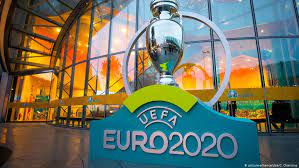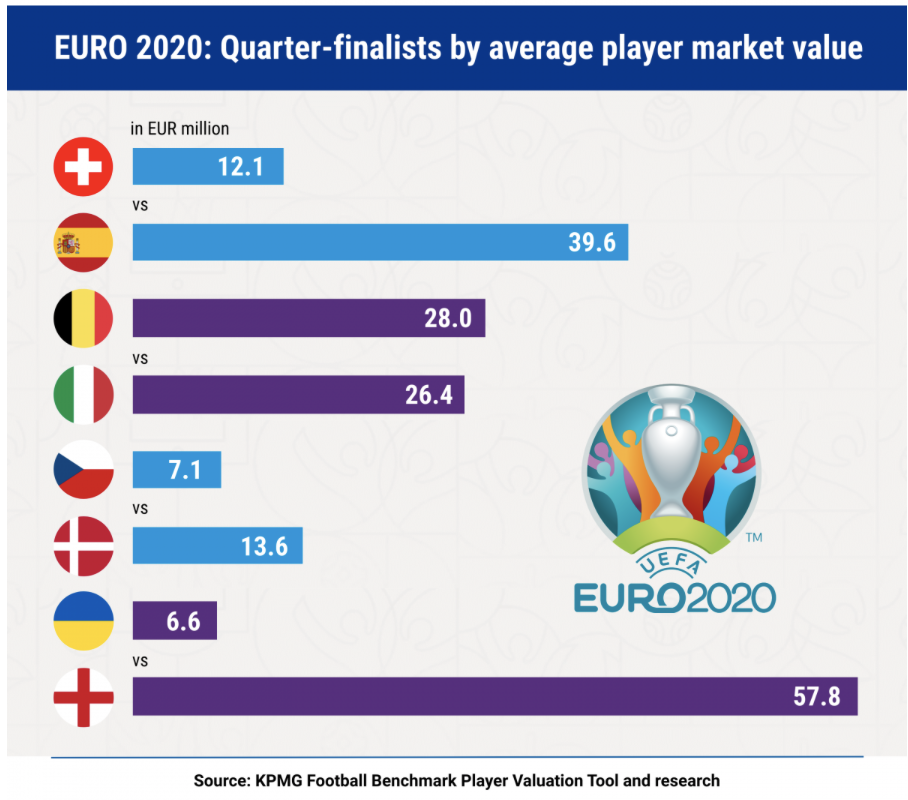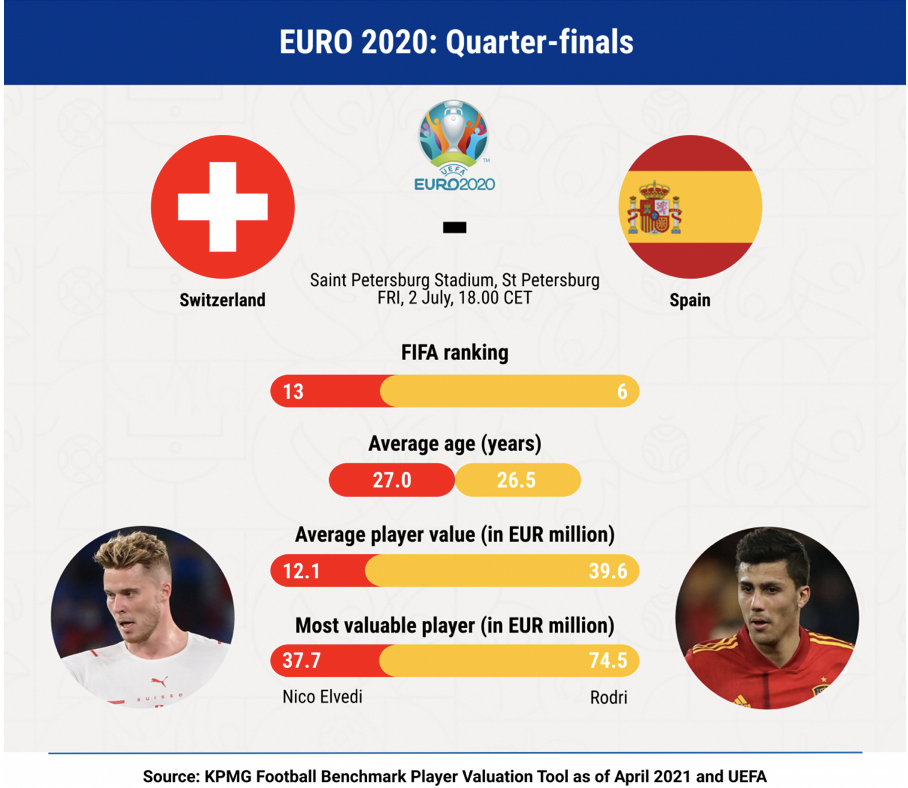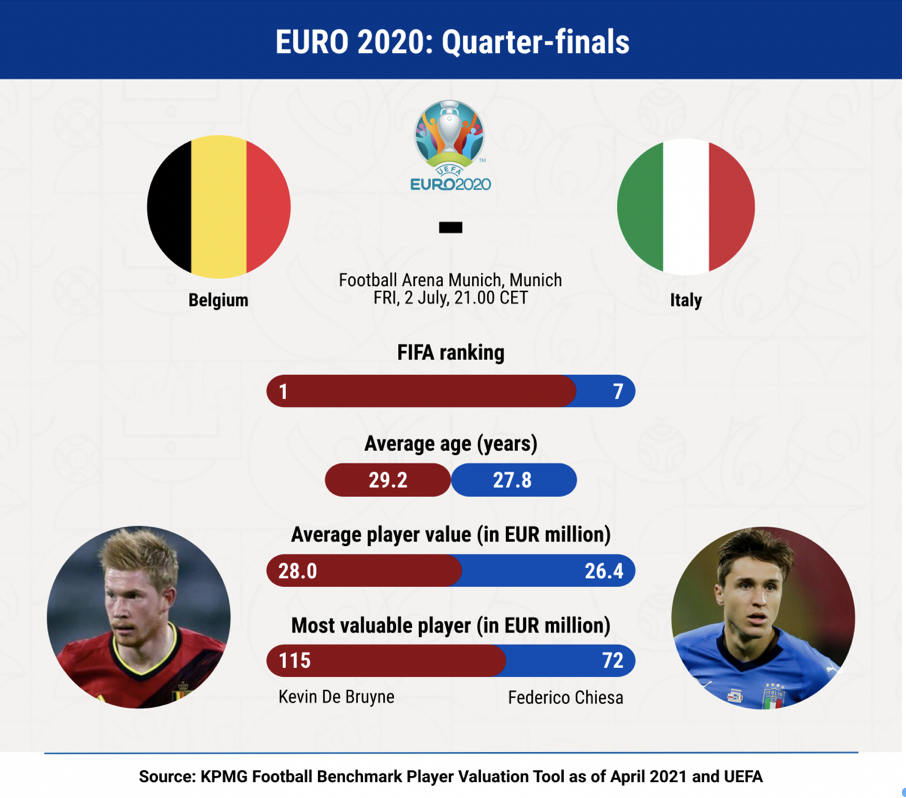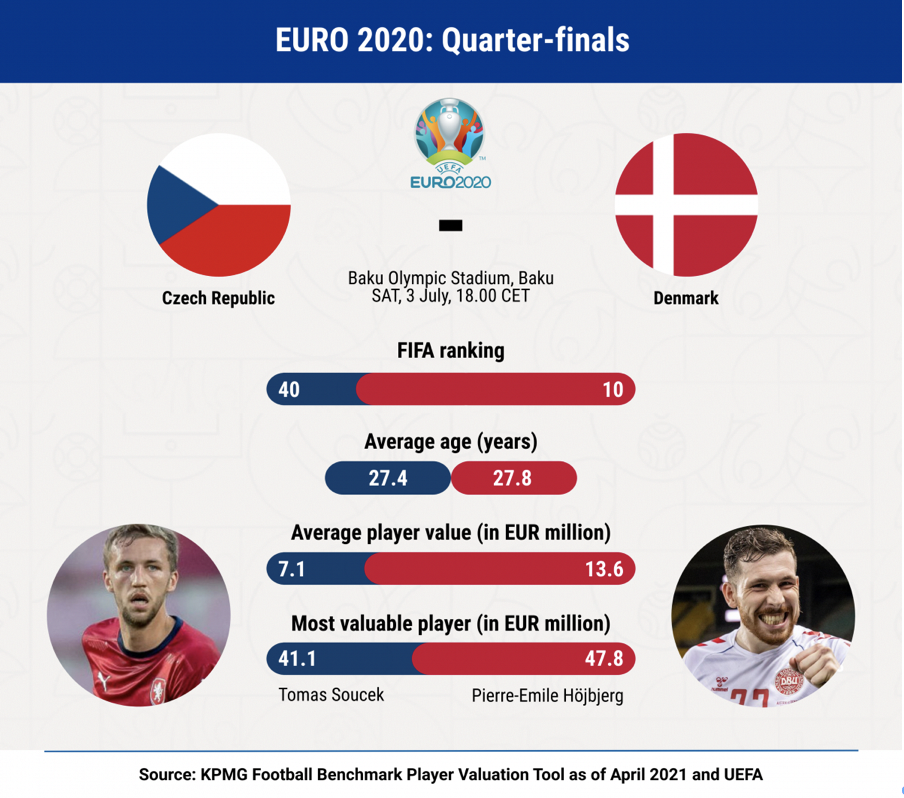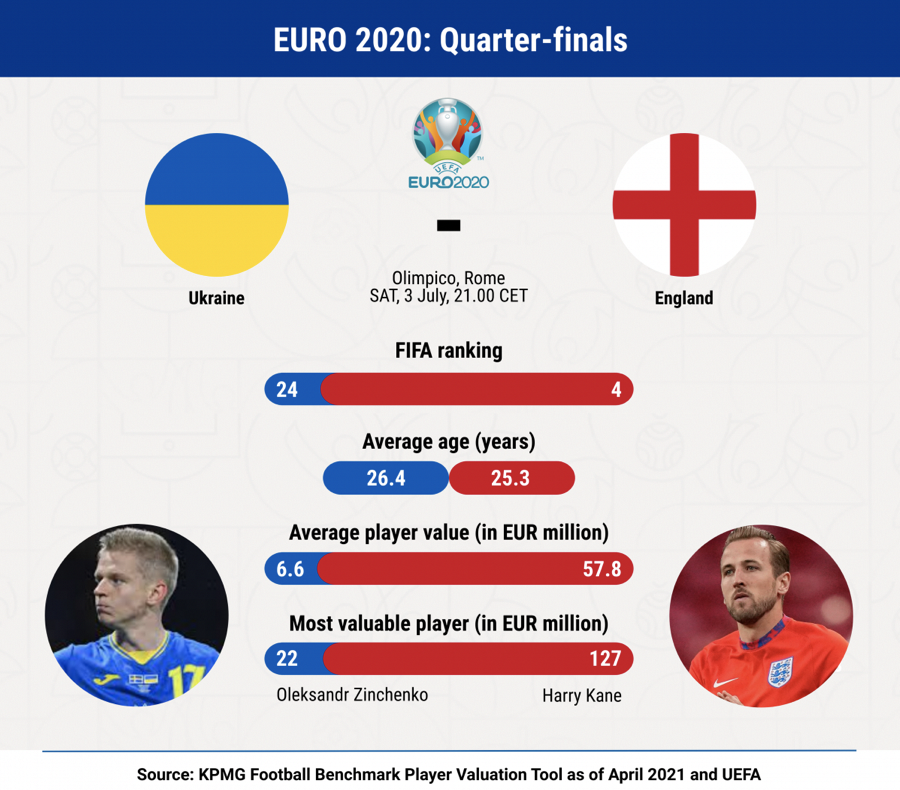July 2 – If the Euros was to be decided by the average market value of players in each of the squad, the England are nailed on winners and Spain would be runners-up of they weren’t in the same side of the draw.
An analysis by the KPMG Football Benchmark team finds that the average value of an England player is €57.8 million. The least valuable players in the quarter finals are Ukrainian – who face England’s next – with an average value of just €6.6 million.
The tightest match-up in the quarter finals is between two of the favourites for championship – Italy with an average player market value of €27.8 million, against Belgium’s average player value of €28 million.
Below is KPMG’s analysis (edited) of each of the quarter final match-ups.
Switzerland vs Spain (2 July, 18:00 CET, St Petersburg)
The two sides played their best games of the tournament in their last-16 matches: Switzerland eliminated world champions France on penalties, while Spain reached the quarter-finals beating Croatia 5-3. Both games on Monday saw late goals overturning 3-1 deficits in extra time, and produced 14 goals in total.
The Swiss win was a surprise, as the Swiss had a slow start into the tournament and only finished 3rd in their group. But they have a solid squad, with a majority of their players contracted by big-5-league clubs, and FIFA ranks the country 13th, right behind Germany.
Spain only named a 24-member squad to the tournament, which is less star-studded than in recent tournaments, nevertheless has a great number of young talents. The younger and less experienced team had a rugged start, with two draws (against Sweden and Poland), before hammering Slovakia 5-0, and then overcoming Croatia in the last-16, scoring 10 goals in their last two matches.
Spain could win the tournament for a record 4th time, while the Swiss have reached the quarter-finals now for the first time.
.
Belgium vs Italy (2 July, 21:00 CET, Munich)
Belgium entered the tournament as one of the big favourites, and are number one in FIFA’s world rankings. They have one of the oldest and most experienced teams – registering both the most international caps and goals by their players combined among all the 24 national teams of the tournament.
Italy’s relatively younger and less experienced squad are one of the dark horses. Nevertheless, the rejuvenated Azzuri under Roberto Mancini have been a pleasant surprise, displaying spectacular and impressive football.
Both teams have won all their four matches so far. The quarter-final will be the first true heavyweight tie for Italy – so far they faced only less powerful opponents, overcoming Switzerland, Wales, Turkey and Austria, and conceded only one goal. Belgium passed through Denmark, Finland and Russia in the group stage, but had a tougher test in the last-16, beating title holders Portugal 1-0. By winning the tournament, Belgium could collect their first European Championship trophy, while Italy could snag their second.
Czech Republic vs Denmark (3 July, 18:00 CET, Baku)
The two surprise sides of the tournament have to travel to Azerbaijan for their clash. They last met in the quarter-finals of EURO 2004, when the Czechs beat Denmark 3-0.
Denmark had a horrid start in their campaign, not only losing star player Christian Eriksen in their first match, but also losing their first two ties against Finland and Belgium. An emotional revival and win over Russia, however, sealed the second spot in their group, with three points only. In the last-16 they comfortably beat Wales 4-0.
The Czech Republic brought about one of the shocks of the tournament so far by stunning the Netherlands in the last-16. Along with Switzerland and Ukraine, they are also a team that finished only 3rd in their group, but managed to progress to the quarter-finals. Being ranked 40th in the world by FIFA, the Czechs are 30 places behind the Danes, and are also the lowest-ranked national team among the quarter-finalists.
The Danes shocked the world by winning EURO 1992, a tournament they had not qualified for but were invited to partake in the eight-team tournament with just over a week’s notice, with Yugoslavia being in a state of civil war andnot allowed to participate. The absolute underdogs, the Danes cut their holidays short and went on to become champions.
The Czechs have participated in 10 EURO tournaments – three as Czechoslovakia and seven as the Czech Republic. In 1976, as Czechoslovakia, they became European champions, while as Czech Republic they were runners-up at EURO 1996.
Ukraine vs England (3 July, 21:00 CET, Rome)
Having beaten Germany in the previous round, the revitalised England squad is seen by many as the favourites to win the European Championship, for the first time. While they have one of the youngest and least experienced squads, the power of their individual talents is proven by the fact that England boast some of the most valuable players of the tournament, and almost all of them play in the Premier League. Their chances are boosted by the fact that the semi-finals and the final are to be played on home ground, in London’s Wembley stadium
Ukraine progressed from the group stage with three points and a negative goal difference, and beat 10-man Sweden in the last 16 with a last-gasp winner to secure a quarter-final with England. This has been Ukraine’s best EURO achievement so far – they exited the tournament in the group phase in 2012 and 2016. Now they have a rather young, but more closely-knit team, with 10 players coming from the same club, domestic champions Dynamo Kyiv.
Contact the writer of this story at moc.l1744742493labto1744742493ofdlr1744742493owedi1744742493sni@n1744742493osloh1744742493cin.l1744742493uap1744742493

